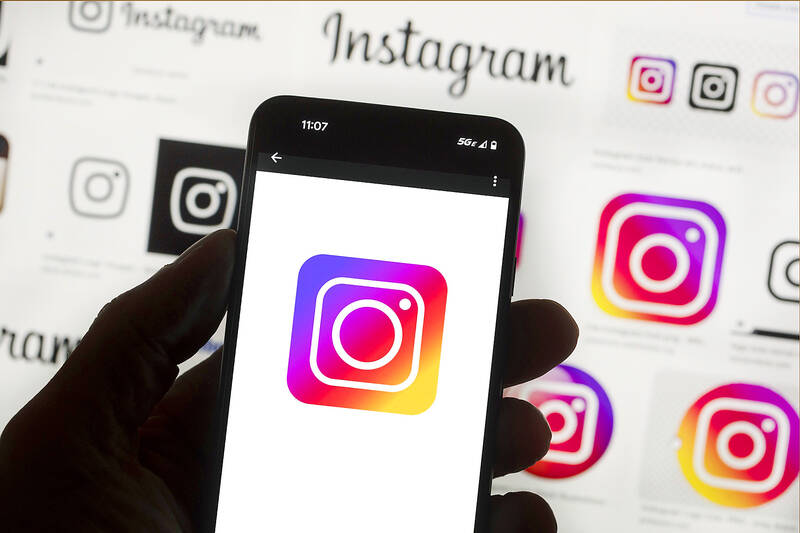Instagram is changing the default privacy settings for many US teenagers, part of an effort to keep them safer and give parents more control over how their kids interact online.
The new settings will make teen accounts private by default, limit who those users can send private messages to, and put teens in the “most restrictive” tier when it comes to viewing sensitive content. That means the app will block teens from seeing sensitive photos and videos, including posts that show people fighting or certain cosmetic procedures.
These more restrictive settings will be turned on automatically for all Instagram users under 18 years of age, the company said on Sept. 17, though 16- and 17-year-olds can change them on their own. If a younger teen tries to evade the new restrictions by changing their birthday on the service, Meta said it will use artificial intelligence technology to try and “proactively find these teens and place them” into more restrictive accounts.

Photo: AFP 照片:法新社
The restrictions for those under 16 can be relaxed if a parent provides permission via their own Instagram account.
The widespread changes come after years of criticism that Instagram, which is owned by Facebook parent company Meta Platforms Inc., has failed to adequately protect young people online. Meta was sued last year by a group of more than 30 states alleging the company’s apps are harming young people, and Chief Executive Officer Mark Zuckerberg appeared at a congressional hearing earlier this year on child safety where Meta was criticized for enabling child sexual exploitation. Zuckerberg has fought in court to avoid facing personal liability for any alleged harms.
In 2021, a Facebook whistleblower went public with hundreds of pages of internal Meta documents, including the company’s own research that found Instagram had a negative impact on the mental health for some teen girls.

Photo: Reuters 照片:路透
Instagram boss Adam Mosseri said the new policies and restrictions have been in the works for the better part of a year, and that they weren’t designed to appease angry lawmakers. “Honestly, it’s not designed for any of them,” he said. “My hope is that it’s received well by parents and by teens because that’s exactly who it’s designed for.”
The new account settings represent the company’s most aggressive effort to date to protect younger users. Teens will only be able to receive messages from people they already follow or that they are already connected to and can only be tagged or mentioned by users they follow. Teens will also receive a notification to leave the app after 60 minutes of use each day.
Parents will also be able to see which accounts their teen is messaging, but won’t be able to read the actual messages.
Mosseri said the idea behind the increased restrictions is similar to the plan Meta had for “Instagram Youth,” a proposal for a version of the app for kids under 13. That plan was scrapped in 2021, and Mosseri said there is no plan to revive it.
The new restrictions will be live to all users under 18 in the US, UK, Canada and Australia within the next 60 days, and Meta plans to deploy them to the rest of the European Union later this year. They’ll be deployed globally starting early in 2025.
(Bloomberg)
Instagram正更改許多美國青少年的帳號隱私預設,以加強安全,並讓父母更能掌握孩子的網路互動。
新的預設將青少年帳號設定為不公開,限制可發私訊的對象,並將青少年查看敏感內容的級別設為「最嚴格」。這表示青少年將不會在該應用程式上看到敏感照片及影片,包括打架或某些整形手術的貼文。
該公司9月17日表示,所有18歲以下的Instagram用戶將自動套用這些更嚴格的設定,但16及17歲的用戶可自行更改這些設定。Meta表示,若年齡較小的青少年試圖以更改Instagram上的生日來規避新的限制,它將使用人工智慧技術來嘗試「主動找到這些青少年,並將其納入」限制較嚴格的帳戶。
如果家長透過自己的Instagram帳號提供許可,則可放寬16歲以下兒童的限制。
Facebook母公司Meta Platforms Inc.旗下的Instagram由於未能充分保護兒少的上網安全,多年來一直飽受批評。Meta去年被美國三十多個州起訴,指控該公司的應用程式傷害年幼者。由於Meta被批評助長兒童性剝削,該公司執行長馬克‧祖克柏今年稍早出席了美國國會聽證會。對於指稱所造成的傷害,祖克柏在庭上辯解,以規避承擔個人責任。
2021年,一名Facebook吹哨者公開了數百頁的Meta公司內部文件,包括該公司自己的研究,該研究發現Instagram對一些青少女的心理健康造成了負面影響。
Instagram 主管亞當.莫塞里表示,新的措施與限制已醞釀了一年多,其目的不是安撫憤怒的國會議員。「老實說,這不是為他們任何一人設計的」,他說。「我希望它能受到家長和青少年的好評,因為這是為他們設計的」。
新的帳戶設定是該公司為保護年少用戶迄今最積極的作為。青少年只能從已追蹤或已連結的帳號接收訊息,只能被已追蹤帳號標註。而且每天使用超過60分鐘後,會收到退出應用程式的通知。
家長還可以查看孩子向哪些帳號發送訊息,但無法閱讀訊息本身。
莫塞里表示,所增加的這些限制,其背後概念類似Meta的「Instagram Youth」計畫。該計畫擬提供13歲以下兒童用的版本,但在2021年作罷,莫塞里表示並未有重新進行的打算。
Instagram將在未來60天內將美國、英國、加拿大和澳洲所有18歲以下的用戶轉為青少年帳號,Meta計劃在今年稍晚擴展至歐盟各國,而在2025年初在全球各地生效。
(台北時報林俐凱編譯)

In today’s digital age, every click and swipe generates data, and the need for reliable and efficient data management has become critical. This is where data centers come into play. Data centers include servers, storage drives, networking equipment, and other hardware to manage, process, and store vast amounts of digital information. __1__ For that reason, some companies are pursuing an unusual idea: placing data centers under the surface of the ocean. What makes underwater data centers cheaper than traditional land-based ones? For one thing, the cool temperature of the ocean means that companies can cut down on the high cost of

A: Apart from BTS’ J-Hope and EXO’s Xiumin, Hong Kong singer Eason Chan is holding six concerts in Kaohsiung. B: And versatile British musician Jacob Collier is visiting Taiwan for the first time, performing in New Taipei City tonight. A: US singer Lauv and rock band LANY will also stage individual shows in Kaohsiung next week. B: Plus, Singaporean singer JJ Lin will hold two concerts at the Taipei Dome in early June. A: Which show are you going to? A: 除了BTS的J-Hope和EXO的Xiumin,香港歌王陳奕迅正在高雄熱唱6場。 B: 而多才多藝的英國歌手雅各柯里爾首度訪台,今晚即將在新北開唱! A: 美國歌手洛夫、搖滾樂團藍尼下週也分別在高雄演出。 B: 此外新加坡歌王林俊傑則將於6月初,首次挑戰台北大巨蛋嗨唱兩場。 A: 你想去聽誰的演唱會? (By Eddy Chang, Taipei Times/台北時報張迪)

US President Donald Trump on Monday last week signed the TAKE IT DOWN ACT (Tools to Address Known Exploitation by Immobilizing Technological Deepfakes on Websites and Networks Act), bipartisan legislation that enacts stricter penalties for the distribution of non-consensual intimate imagery, sometimes called “revenge porn,” as well as deepfakes created by artificial intelligence. The measure, which goes into effect immediately, was introduced by Sen. Ted Cruz, a Republican from Texas, and Sen. Amy Klobuchar, a Democrat from Minnesota, and later gained the support of First Lady Melania Trump. Critics of the measure, which addresses both real and artificial intelligence-generated imagery, say

1. 我不夠快。 ˇ I wasn’t fast enough. χ I wasn’t enough fast. 註:enough用作副詞時,一般放在它修飾的形容詞或其他副詞後面。例如: The tea is hot enough.(茶是夠熱。) He did not work hard enough.(他不夠用功。) 但enough用作形容詞時,前置或後置都可以。例如: There is enough food (/food enough) for us. 2. 今晚七時我們將開董事會。 ˇ We are having a board meeting at seven o’clock this evening. ˇ We are having a board meeting this evening, at seven o’clock. χ We are having a board meeting this evening at seven o’clock. 註:如果有多個時間副詞,一般單位大的放在單位小的後面。例如: I was born in May 1939. The meeting was held at five o’clock yesterday afternoon. 但如果大的單位是說話者強調的重點,則可以放在前面,但後面要有逗號,表示停頓。例如: He arrived yesterday afternoon, at about five o’clock. 3. 我生於麻州波士頓。 ˇ I was born in Boston, Massachusetts. χ I was born in Massachusetts, Boston. 註:一般而言,地點副詞的位置,範圍大的放在範圍小的後面。例如: Before